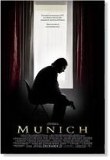 Chapters
Steven Spielberg, Tony Kushner, Eric Bana, Daniel Craig, Geoffrey Rush, Azelet Surer, and more.
Slaughter during Olympic Games and follow-up Operation Wrath of God.
Steven Spielberg explores a definitive moment in history.
Steven Spielberg brings Pulitzer Prize-winning Tony Kushner.
Global cadre of 200 actors joins the production.
Steven Spielberg and Janusz Kaminski update gritty '70s thriller.
Bringing a hidden world to light in Malta, Hungary.
Ain't No Sunshine, Papa Was A Rollin' Stone, Ela-Ela, Black Magic Woman, Prelude To A Kiss, Palamakia, and more.
|
“Our worst fears have been realized tonight.” With those words, uttered on September 6, 1972, television announcer Jim McKay brought the overwhelming news that the 11 Israeli athletes, coaches and sporting officials taken hostage by Palestinian kidnappers in the Olympic Village at Munich were all dead, most of them killed on the tarmac of Furstenfeldbruck Airport on the outskirts of Munich in the midst of the German authorities' final botched rescue attempt. A shock wave rippled across a world already engulfed by conflict. With turmoil raging in Vietnam, Northern Ireland and the Middle East, not to mention protest and unrest in the streets of America and Europe, these Olympics had been seen as a much-needed reminder of global unity and a brief oasis of peace.
But it was not to be. The world soon learned that the men who had broken into the Olympic Village wearing tracksuits, armed with Kaleshnikov rifles and bearing hand grenades were Palestinian fedayeen (literally “men of sacrifice”). Many of them had been recruited from refugee camps in Jordan, Syria and Lebanon; their aim was to bring the Palestinian cause to worldwide attention and exchange their hostages for the release of 234 Palestinian prisoners, as well as the notorious German terrorist leaders Andreas Baader and Ulrike Meinhof.
From the beginning, the staunch Israeli government of Golda Meir refused any negotiations, and Germany refused to allow an Israeli special-forces team to operate in Munich. Instead, the German police launched their own series of ill-fated hostage rescues. It began pre-dawn on September 5 and continued for 21 hours-involving several hastily aborted plans and ultimately resulting in a chaotic shoot-out in which the hostages, five of their kidnappers and a German police officer died. German police took the remaining three kidnappers alive. Weeks later, in what many believe was a staged event based upon a deal struck between the Palestinians and the German government, the three surviving fedayeen would be released from German prison when hijackers of a Lufthansa plane demanded their release.
The Olympic games continued after a memorial service, despite the somber, stricken mood. In the media and around the world, there was an attempt to return to some pretense of normalcy.
What happened next never made the evening news. Publicly, Israel responded to the terrorist act on September 9 when its Air Force bombed PLO bases in Syria and Lebanon. At the same time, Prime Minister Golda Meir and the Israeli cabinet's top-secret “Committee X” authorized another mission that would never be spoken about. They devised a deep undercover effort designed to strike fear into the hearts of all terrorists threatening Israel-the elimination of 11 suspected Black September operatives by any means necessary.
This was “Operation Wrath of God,” the still controversial and heavily debated targeted assassination program that, according to several published sources, would ultimately kill at least 13 men without prosecution or trial. The international team of anonymous, but skilled, assassins that Israel created came to have a resounding impact that continues to echo today. Though neither the Israeli government nor the Israeli secret intelligence agency-the Mossad-have ever officially acknowledged the existence of these hit squads, a number of books and documentaries utilizing inside sources have since provided details of how and why “Wrath of God” carried out its aims. Two Israeli generals have also publicly confirmed that the targeted assassination squads did indeed exist: General Aharon Yariv in a 1993 BBC documentary and General Zvi Zamir in a 2001 60 Minutes interview.
For film producer Barry Mendel, the events of Munich 1972 were always a vivid, harrowing memory-and the more he learned about them, the more they haunted him, which is why he began to envision a thought-provoking suspense thriller about the most unknown and contentious part of the unforgettable story. Mendel has strong recollections of the tragic day it all started and the feeling that something in the world had changed for all time.
“I remember Mark Spitz winning all those medals, and the next morning we woke up, turned on the Olympics, and there was Jim McKay telling everyone what had happened,” recalls Mendel. “And that was it. My whole family was suddenly riveted to the TV. We spent the whole day together watching the events unfold, and it was something I knew the world would never forget.”
Mendel developed the project for four years. Kathleen Kennedy heard about the project from Mendel, with whom she had previously worked on the innovative mystery-thriller The Sixth Sense. She, in turn, brought the story to director Steven Spielberg, who finally decided to go forward with the project on the heels of his apocalyptic blockbuster War of the Worlds, based on H.G. Wells' classic science fiction novel.
Kennedy felt the story was an ideal match for Spielberg's eclectic, but always keenly focused, storytelling sensibilities from the minute she heard the idea. “Steven has the facility to be such a great storyteller, and with a piece of material like this and a subject matter that carries so much importance, I became very excited by the possibilities,” she says. “I couldn't think of anybody better suited to this story.”
Kennedy continues, “Today, we're bombarded with so much information and there are so many events happening on a daily basis, I think that to really go back in history and get perspective is something that storytellers and filmmakers can do-in order to make sure that we don't forget where we have been. I think that's an important reason why Steven decided to do this movie. It's an event that sheds light on a lot of current events and it allows us to step back and ask what happened 33 years ago and what did we learn from it? At the same time, it is an edge-of-your-seat thriller that would be compelling, even it weren't based on truth.”
Spielberg has previously explored resonant moments in history with such epic films as Empire of the Sun, Schindler's List and Saving Private Ryan. The story of Munich also seemed to raise imminently vital questions about the world in 2005 and beyond, which is partly what drew Spielberg to explore the 33-year-old event in more human detail than previously seen.
Spielberg has his own intense memories of 1972. “I remember exactly where I was, the television set I was watching it on, and how I was watching-like everybody else, Wide World of Sports, when this incident took place,” he says. “It made an indelible impression on me, and I think that impression was redoubled years later when I saw the documentary One Day in September.”
|
||||
